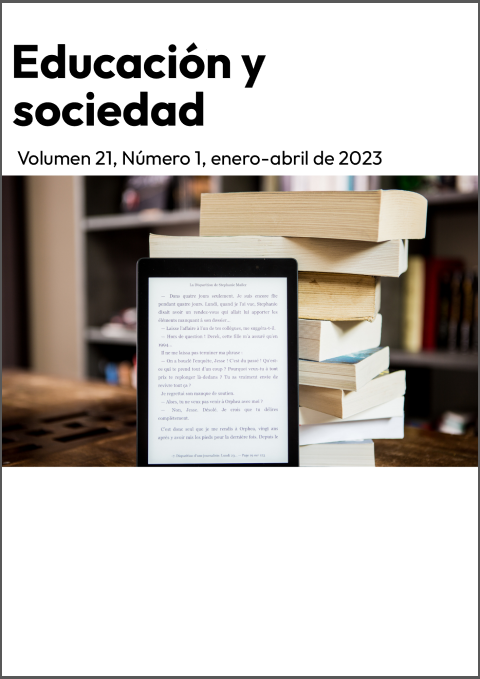School education in Colón (1902-1958): axiological training from the school, family and community integration
Keywords:
schooled education, Colón, axiological formation, school, family and community integrationAbstract
The paper seeks to reveal the teaching practices and the role they give to the axiological training of the new generations through school education in the city of Colón, Matanzas province, Cuba, between 1902 and 1958. Allusion is made to the different ways in which the teachers of the city empirically opted for the axiological formation of their students through the school, family and community relationship. In the work, reference is made to school civic ceremonies, inside and outside the school, with emphasis on the Colombian patriotic circuit and the description of this operation. Experiences of Colombian teachers aimed at promoting the axiological training of their students through the school, family and community relationship are introduced; using school recitals, pageants, parent-teacher organization, etc. From the methodological point of view, it corresponds to historical educational research and various documentary records are used as sources, such as the Colombian press of the time, the history of Columbus told by one of its protagonists Pelayo Villanueva, photographs of the time, among others.
References
Colectivo de autores (1992): Historia de Colón (hasta 1980), Investigación inédita, Museo Municipal José Ramón Zulueta, Colón (formato digital).
Cordoví, Y. (2016): Construyendo al ciudadano: historia y cívica en las escuelas públicas de Cuba entre 1899 y 1920, en: Cuba Posible, http://cubaposible.com
González Quintana, C. M. (2007): Heribeta Martínez Martínez: maestra de Mario Muñoz, Investigación inédita, Museo Municipal José Ramón Zulueta, Colón.
Góvez Pérez, M. (1992): Desarrollo educacional de Colón durante la República, Colón: Investigación inédita, Museo Municipal José Ramón Zulueta.
Iglesias Utset, M. (1999). LAS POLÍTICAS DE LA CELEBRACIÓN: fechas católicas, yanquis y patrióticas en la Cuba de la intervención norteamericana (1898-1902), Ponencia presentada en la Conferencia Anual de la Asociación de Historiadores del Caribe, La Habana, 11-17 de abril de 1999 (inédito).
Mediva Carballosa, E. (2012): “La educación identitaria en la escuela cubana; una mirada retrospectiva desde sus raíces en el período histórico (1902-1958), en: Revista electrónica Luz, año XI, no. 3, 2012, pp. 1-13;
Montoro, R. (1902): Principios de Instrucción moral e instrucción cívica, La Habana.
Quiza Moreno, R. (1998): “Cuba: historia, escuela, nacionalismo (1902-1930)”, en: Debates Americanos, No. 5-6, La Habana, enero-diciembre de 1998, pp. 76-89.
Varona, E. J. (1901): Cursos de estudios para las escuelas públicas, Habana.
Vidal Morales y Morales, A. (1924): Nociones de Historia de Cuba, Habana.
Villanueva, P. (1934): Hechos, cosas y sucesos de este pueblo que no deben ser olvidadas al escribirse su historia, Colón: Imprenta Paltenghi.
Downloads
Published
How to Cite
Issue
Section
License
Copyright (c) 2023 Educación y sociedad

This work is licensed under a Creative Commons Attribution-NonCommercial-ShareAlike 4.0 International License.
Los autores ceden su derecho de autor a Educación y Sociedad y otorgan a todos los usuarios potenciales, de manera irrevocable y por un período de tiempo ilimitado, el derecho de utilizar, copiar, transformar y distribuir el contenido. La cesión de derecho de autor incluye también:
- Traducir, adaptar, reutilizar, resumir el trabajo y ejercer todos sus derechos sobre dichas adaptaciones, resúmenes, extractos y obras derivadas.
- Incluir el trabajo y su versión traducida, adaptada o resumida, total o parcialmente, en bases de datos informatizadas, selección o recopilación de textos digitales o impresos a disposición de terceros.
Cada autor asume que en caso de que el artículo fuese aprobado para su publicación en la revista Educación y Sociedad:
- Cede sus derechos patrimoniales y autoriza al comité editorial para la publicación del documento con el correo electrónico y la afiliación institucional de los autores.
- Autoriza la divulgación en la página web de la revista, en repositorios y directorios en se incluye o pueda incluirse en el futuro.
- Certifica que ha contribuido directamente al contenido intelectual de este manuscrito.
- Se responsabiliza públicamente con su contenido y acepta que su nombre figure en la lista de autores.
- Garantiza que el artículo es un documento original y no ha sido publicado total ni parcialmente, en ningún otro lugar.
- No ha incurrido en fraude científico, plagio o vicios de autoría; en caso contrario se exime de toda responsabilidad a la revista Educación y Sociedad y se declara responsable.
- Se compromete a no presentar este artículo a otra revista para su publicación, hasta recibir la decisión de la editorial de la publicación sobre el concepto final.











